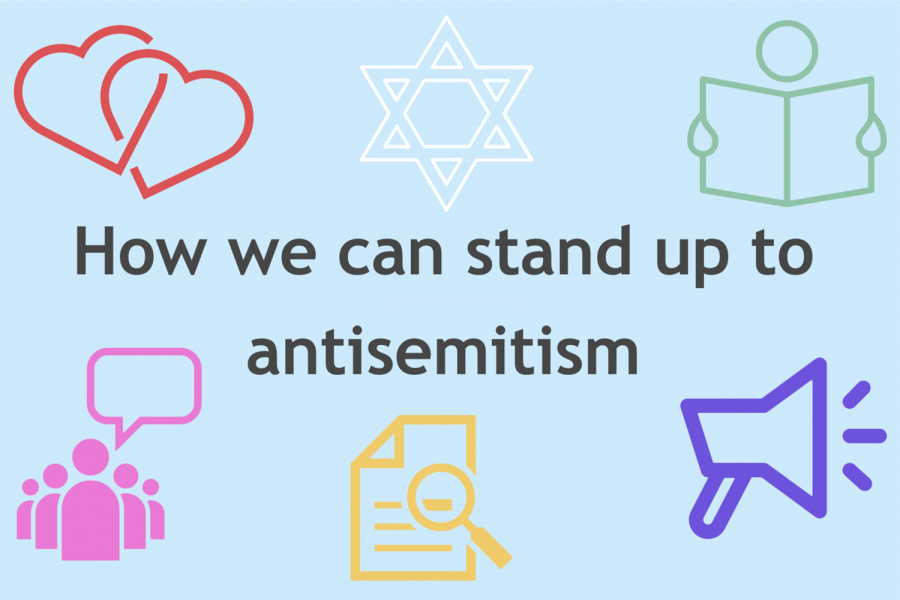Editorial: How we can stand up to antisemitism
Photo credit: Audrey Chang
In response to the rise in antisemitic incidents in Los Angeles, we can stand up to antisemitism by staying informed, supporting the Jewish members of our communities and speaking out against antisemitic actions. Ye’s antisemitic tweets Oct. 8 sparked public demonstrations in Los Angeles.
November 6, 2022
While Jewish people make up only 2% of the U.S. population and 0.2% of the world population, they have consistently been the most targeted group in the U.S. for anti-religious hate crimes.
Even if you don’t identify as Jewish, it is important to speak up as an ally and to show the Jewish people in your community that you support them. The most recent example of a large-scale antisemitic incident was rapper Ye’s, formerly known as Kanye West, hateful tweets that threatened to go “death con 3 on JEWISH PEOPLE” Oct. 8. With this most recent incident, we must denounce Ye’s hateful tweets by not listening to his music or buying his products. The “separating the art from the artist” approach is unacceptable when the artist has invoked so much hate.
We must unequivocally denounce and call out any antisemitic behavior we see and stay informed about issues and events impacting the Jewish community. Show your Jewish friends, family members and other people in your community that you care by making the effort to learn about the issues affecting them and how you can take action.
West has 31.7 million Twitter followers, which is greater than the global Jewish population of approximately 15.2 million. This display of hate speech on such a large platform is dangerous and has had serious consequences for Jewish people, as it has incited further antisemitic behavior and demonstrations. This included the antisemitic hate group, the Goyim Defense League, organizing a demonstration above an overpass on the 405 freeway in Los Angeles. They displayed posters saying “honk if you know Kanye is right about the Jews.”
The Goyim Defense League also dispersed flyers with antisemitic messages in Beverly Hills and other Los Angeles neighborhoods following Ye’s tweets. Some residents found fliers at their homes containing stereotypes and conspiracy theories about the Jewish and LGBTQ+ communities.
Hate groups have been able to capitalize on the momentum Ye’s rhetoric has given to antisemitic hate. His overt antisemitism has given extremist groups the platform and support to grow past the internet to public demonstrations.
Additionally, a large part of his fanbase is young, impressionable people whose views are still being formed. This makes it especially vital for people to speak out against Ye’s actions and limit his influence to perpetuate hateful ideologies onto young and loyal people.
Many companies and individuals have since severed ties with Ye, including Adidas, Gap and Balenciaga. In addition to dropping Ye, Gap and Adidas also spoke out against his actions and views. Creative Artists Agency (CAA) has also dropped him as a client.
These companies have done the right thing by ending relationships with Ye, and losing these partnerships will hurt him financially and help limit his platform. However, we can also each make a positive impact with our individual actions. Denouncing any antisemitic behavior shows our Jewish friends that we support them and are trying to gain a better understanding of their experiences.
This problem extends far beyond and before Ye’s deplorable posts. Even before this incident, the Anti-Defamation League, which keeps track of antisemitic incidents in the U.S., found 2,717 incidents in 2021, a record high that was a 34% rise from 2020.
According to a 2021 study by the Cohen Center for Modern Jewish Studies at Brandeis University, the Los Angeles Jewish community is the second largest federated Jewish community in the U.S. As part of a city with a large population of Jewish people who are experiencing a time with increasing numbers of hateful incidents and speech against their religion, it is imperative that we all take a stand against antisemitic speech and behavior and show our support.
For example, Archer’s Jewish Student Union held a meeting Oct. 24 following the antisemitic demonstrations in Los Angeles, and it was open to all students who wanted to discuss the incident, their feelings about it and become more informed on the issue and how they can take action. When given the opportunity, we should all try and learn more from Jewish members of our communities and take advantage of these spaces to seek a more personal understanding of their experiences.
We can also celebrate the community by looking to Jewish change makers and supporting and donating to Jewish organizations. For example, the Karsh Center is run by the Wilshire Boulevard Temple in Los Angeles, and their four program areas are Parent and Child Wellbeing, Legal Services, Food and Nutrition Security and Health and Wellness. Another example is Temple Beth El, whose Social Action Committee has programs to help with education, advocacy and action on social justice issues.
The more informed we can become about these acts of antisemitism and how we can fight them, the easier it will be for people to stand up to hateful actions like these, which will help prevent more in the future.
This is a deep-rooted and complex issue that will be difficult to completely resolve, but taking a strong stance against incidents like this is a start.









